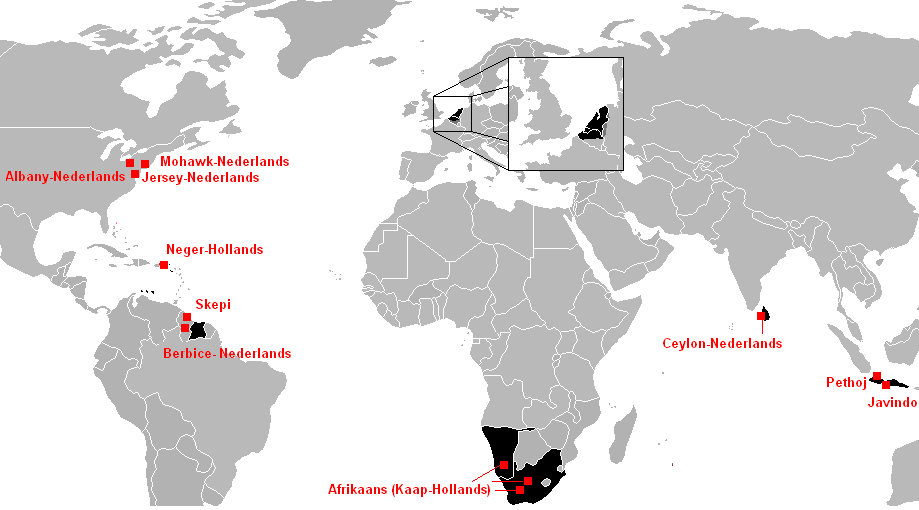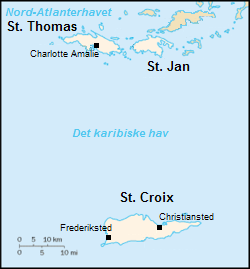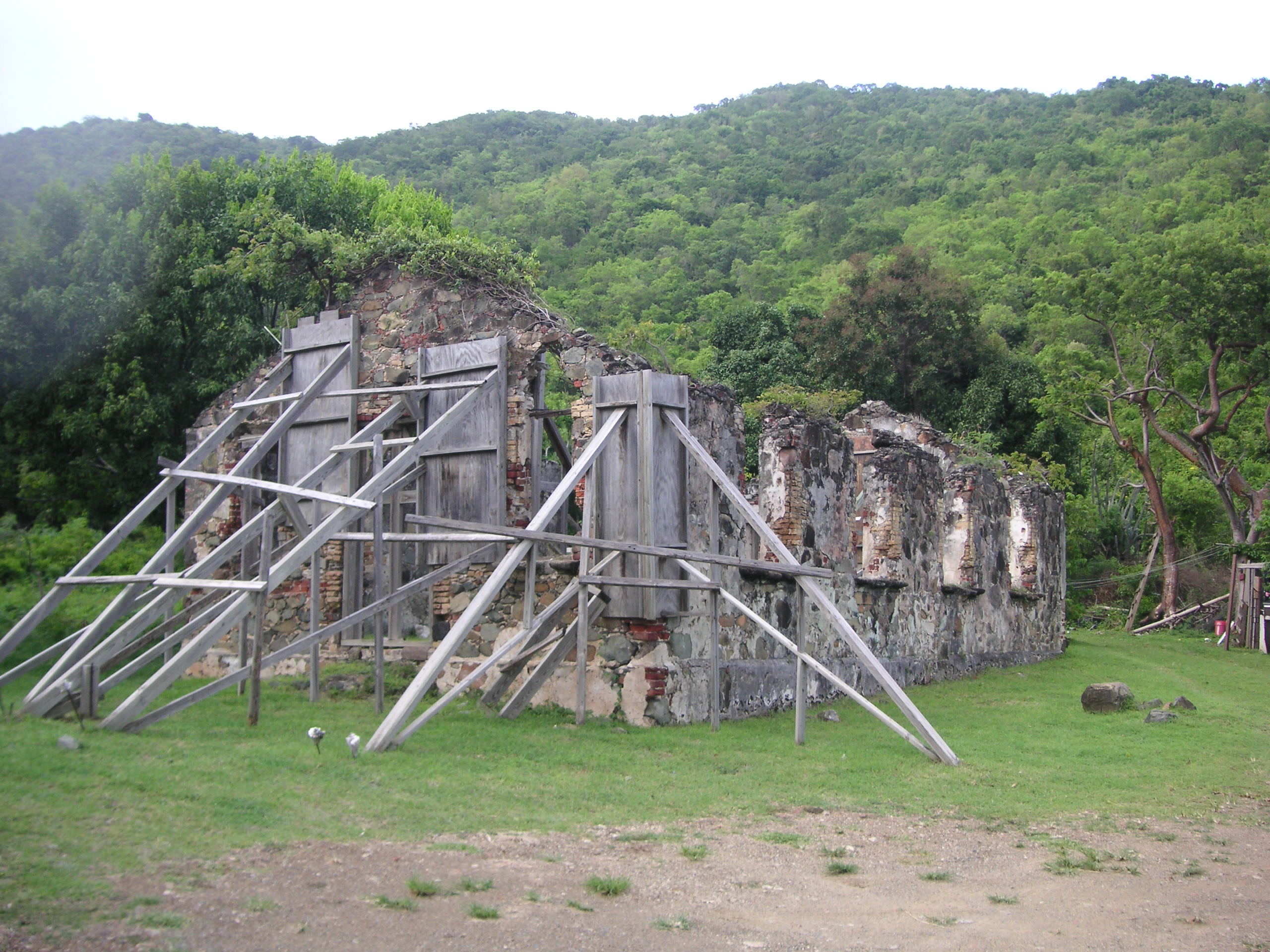|
Negerhollands
Negerhollands ('Negro-Dutch') was a Dutch-based creole language that was spoken in the Danish West Indies, now known as the U.S. Virgin Islands. Dutch was its superstrate language with Danish, English, French, Spanish, and African elements incorporated. Notwithstanding its name, Negerhollands drew primarily from the Zeelandic rather than the Hollandic dialect of Dutch. History Negerhollands emerged around 1700 on the Virgin Islands Saint Thomas and Saint John, then Danish colonies. According to one of the most prevalent theories about its origin, slaves took the embryonic creole language to the island of Saint Thomas when they accompanied the Dutch planters who fled the island of Sint Eustatius after it had been raided by the English in 1666. A census on Saint Thomas from 1688 indeed shows that of the 317 European households on Saint Thomas, 66 (21%) were Dutch, 32 (10%) were English, and 20 (6%) were Danish. This also helps explain the considerable influence English ... [...More Info...] [...Related Items...] OR: [Wikipedia] [Google] [Baidu] |
Virgin Islands Creole
Virgin Islands Creole, or Virgin Islands Creole English, is an English-based creole consisting of several varieties spoken in the Virgin Islands and the nearby SSS islands of Saba, Saint Martin and Sint Eustatius, where it is known as Saban English, Saint Martin English, and Statian English, respectively. The term "Virgin Islands Creole" is formal terminology used by scholars and academics, and is rarely used in everyday speech. Informally, the creole is known by the term ''dialect'', as the creole is often perceived by locals as a dialect variety of English instead of an English creole language.Wiltshire, Shari (January 28–29, 2007). "Crucian: Dialect or a language? Professor at UVI to publish dictionary". ''St. Croix Avis'' However, academic sociohistorical and linguistic research suggests that it is in fact an English creole language. Because there are several varieties of Virgin Islands Creole, it is also colloquially known by the specific island on which it is spoken: ' ... [...More Info...] [...Related Items...] OR: [Wikipedia] [Google] [Baidu] |
Berbice Creole Dutch
Berbice Creole Dutch (also known as Berbice Dutch) is a now extinct Dutch creole language, once spoken in Berbice, a region along the Berbice River in Guyana. It had a lexicon largely based on Dutch and Eastern Ijo varieties from southern Nigeria. In contrast to the widely known ''Negerhollands'' Dutch creole spoken in the Virgin Islands, Berbice Creole Dutch and its relative Skepi Creole Dutch, were more or less unknown to the outside world until Ian Robertson first reported on the two languages in 1975. Dutch linguist Silvia Kouwenberg subsequently investigated the creole language, publishing its grammar in 1994'','' and numerous other works examining its formation and uses. History Berbice was settled in 1627 by the Dutchman Abraham van Peere. A few years later, Suriname was settled by Englishmen Lord Willoughby and Lawrence Hyde under a grant from the English King, Charles II. In the beginning, therefore, Suriname was a British and Berbice a Dutch possession. On 22 April ... [...More Info...] [...Related Items...] OR: [Wikipedia] [Google] [Baidu] |
Dutch-based Creole Languages
A Dutch creole is a creole language that has been substantially influenced by the Dutch language. Most Dutch-based creoles originated in Dutch colonies in the Americas and Southeast Asia, after the 17th century expansion of Dutch maritime power. Almost all of them are now extinct, while two known varieties are classified as "critically endangered". The extinction has generally been attributed to a wilful cultural and generational language shift towards standard Dutch or the majority language of the area with each successive generation. Afrikaans is considered to be a daughter language of Dutch and it, by contrast, is vibrant and has completely displaced Dutch in southern Africa. Though not a majority-held position, it is considered by some linguists to be a creole because of its simpler grammar relative to Dutch. List Some important Dutch creoles are the following: Dutch has also made a significant contribution to other creoles: * Papiamento : based mostly on Portuguese ... [...More Info...] [...Related Items...] OR: [Wikipedia] [Google] [Baidu] |
Danish West Indies
The Danish West Indies ( da, Dansk Vestindien) or Danish Antilles or Danish Virgin Islands were a Danish colonization of the Americas, Danish colony in the Caribbean, consisting of the islands of Saint Thomas, U.S. Virgin Islands, Saint Thomas with ; Saint John, U.S. Virgin Islands, Saint John ( da, St. Jan) with ; and Saint Croix with . The islands have belonged to the United States since they were Treaty of the Danish West Indies, purchased in 1917. Water Island, U.S. Virgin Islands, Water Island was part of the Danish West Indies until 1905, when the Danish state sold it to the East Asiatic Company, a private shipping company. The Danish West India Company, Danish West India-Guinea Company annexed uninhabited St. Thomas in 1672; annexed St. John in 1718; and bought St. Croix from France (King Louis XIV) on June 28, 1733. When the Danish West India-Guinea Company went bankruptcy, bankrupt in 1754, Frederik V of Denmark, King Frederik V of Denmark–Norway assumed direct cont ... [...More Info...] [...Related Items...] OR: [Wikipedia] [Google] [Baidu] |
Dutch Language
Dutch ( ) is a West Germanic language spoken by about 25 million people as a first language and 5 million as a second language. It is the third most widely spoken Germanic language, after its close relatives German and English. ''Afrikaans'' is a separate but somewhat mutually intelligible daughter languageAfrikaans is a daughter language of Dutch; see , , , , , . Afrikaans was historically called Cape Dutch; see , , , , , . Afrikaans is rooted in 17th-century dialects of Dutch; see , , , . Afrikaans is variously described as a creole, a partially creolised language, or a deviant variety of Dutch; see . spoken, to some degree, by at least 16 million people, mainly in South Africa and Namibia, evolving from the Cape Dutch dialects of Southern Africa. The dialects used in Belgium (including Flemish) and in Suriname, meanwhile, are all guided by the Dutch Language Union. In Europe, most of the population of the Netherlands (where it is the only official language spoken country ... [...More Info...] [...Related Items...] OR: [Wikipedia] [Google] [Baidu] |
Dutch-based Pidgins And Creoles
A Dutch creole is a creole language that has been substantially influenced by the Dutch language. Most Dutch-based creoles originated in Dutch colonies in the Americas and Southeast Asia, after the 17th century expansion of Dutch maritime power. Almost all of them are now extinct, while two known varieties are classified as "critically endangered". The extinction has generally been attributed to a wilful cultural and generational language shift towards standard Dutch or the majority language of the area with each successive generation. Afrikaans is considered to be a daughter language of Dutch and it, by contrast, is vibrant and has completely displaced Dutch in southern Africa. Though not a majority-held position, it is considered by some linguists to be a creole because of its simpler grammar relative to Dutch. List Some important Dutch creoles are the following: Dutch has also made a significant contribution to other creoles: *Papiamento : based mostly on Portuguese a ... [...More Info...] [...Related Items...] OR: [Wikipedia] [Google] [Baidu] |
Dutch Loango-Angola
Loango-Angola is the name for the possessions of the Dutch West India Company in contemporary Angola and the Republic of the Congo. Notably, the name refers to the colony that was captured from the Portuguese between 1641 and 1648. Due to the distance between Luanda and Elmina, the capital of the Dutch Gold Coast, a separate administration for "Africa South" was established at Luanda during the period of the Dutch occupation. After Angola was recaptured by the Portuguese in 1648, Dutch trade with Loango-Angola did not stop, however. From about 1670 onward, the Dutch West India Company acquired slaves from the Loango region on a regular basis, and Dutch free traders continued this practice until after 1730. History Dutch traders began trading with Loango-Angola in the early 17th century, driven south by increasing competition on the Gold Coast. African traders were generally welcoming of the Dutch, who provided goods the Portuguese were not able to provide. Among other things, t ... [...More Info...] [...Related Items...] OR: [Wikipedia] [Google] [Baidu] |
Moravian Church
The Moravian Church ( cs, Moravská církev), or the Moravian Brethren, formally the (Latin: "Unity of the Brethren"), is one of the oldest Protestantism, Protestant Christian denomination, denominations in Christianity, dating back to the Bohemian Reformation of the 15th century and the History of the Moravian Church, Unity of the Brethren ( cs, Jednota bratrská, links=no) founded in the Kingdom of Bohemia, sixty years before Reformation, Luther's Reformation. The church's heritage can be traced to 1457 in Bohemian Crown territory, including its Lands of the Bohemian Crown, crown lands of Moravia and Silesia, which saw the emergence of the Hussite movement against several practices and doctrines of the Catholic Church. However, its name is derived from exiles who fled from Bohemia to Saxony in 1722 to escape the Counter-Reformation, establishing the Christian community of Herrnhut; hence it is also known in German language, German as the ("Unity of Brethren [of Herrnhut]"). T ... [...More Info...] [...Related Items...] OR: [Wikipedia] [Google] [Baidu] |
Acrolect
A post-creole continuum (or simply creole continuum) is a dialect continuum of varieties of a creole language between those most and least similar to the superstrate language (that is, a closely related language whose speakers assert or asserted dominance of some sort). Due to social, political, and economic factors, a creole language can decreolize towards one of the languages from which it is descended, aligning its morphology, phonology, and syntax to the local standard of the dominant language but to different degrees depending on a speaker's status. Stratification William Stewart, in 1965, proposed the terms acrolect, the highest or most prestigious variety on the continuum, and basilect, the lowest or least prestigious variety, as sociolinguistic labels for the upper and lower boundaries, respectively, of a post-creole speech continuum. In the early 1970s Derek Bickerton popularized these terms (as well as mesolect for intermediate points in the continuum) to refer to the ph ... [...More Info...] [...Related Items...] OR: [Wikipedia] [Google] [Baidu] |
Hoch Kreol
Hoch or Höch is a surname. Notable people with the surname include: *Adolf Hoch (1910–1992), Austrian architect *August Hoch (1868–1919), Swiss-born American psychiatrist *Beverly Hoch (born 1951), American opera singer *Daniel Hoch (born 1979), Swedish soccer player *Daniel K. Hoch (1866-1960), American politician *Danny Hoch (born 1970), American actor and writer *Edward D. Hoch (1930–2008), American writer * Edward W. Hoch (1849–1925), American politician * Eva-Maria Hoch (born 1984), Austrian tennis player * Gottfried Höch (1800–1872), German official *Hannah Höch (1889–1978), German artist * Harry Hoch (1887–1981), American baseball player * Heinrich Theodor Höch (1845–1905), German businessman *Homer Hoch (1879–1949), American politician *Hugó Hoch (fl. 1900), Hungarian fencer *James Hoch, microbiologist *James Hoch (poet), American poet *Johann Otto Hoch (1855–1906), German-born American murderer *Joseph Hoch (1815–1874), German lawyer *Lambert Anth ... [...More Info...] [...Related Items...] OR: [Wikipedia] [Google] [Baidu] |
British Virgin Islands
) , anthem = "God Save the King" , song_type = Territorial song , song = "Oh, Beautiful Virgin Islands" , image_map = File:British Virgin Islands on the globe (Americas centered).svg , map_caption = , mapsize = 290px , image_map2 = British Virgin Islands - Location Map (2013) - VGB - UNOCHA.svg , mapsize2 = 250px , subdivision_type = Sovereign state , subdivision_name = , established_title = , established_date = Dutch West Indies , established_title2 = British capture , established_date2 = 1672 , established_title3 = Cooper Island (British Virgin Islands), Cooper Island sold to UK , established_date3 = 1905 , established_title4 = Separate colony , established_date4 = 1960 , established_title5 = Autonomy , established_date5 = 1967 , official_languages = North American English, English , demonym = , capital = Road Town , coordinates = , largest_city = capital , ethnic_groups = 76.9% Black people, Black5.6% Hispanic5.4% White people, White5.4% Multirac ... [...More Info...] [...Related Items...] OR: [Wikipedia] [Google] [Baidu] |
Skepi Creole Dutch
Skepi is an extinct Dutch-based creole language of Guyana, spoken in the region of Essequibo. It was not mutually intelligible with Berbice Creole Dutch, also spoken in Guyana. This language has been classified as extinct since 1998. Description By the twentieth century, the existence of a Dutch creole language in the former Essequibo colony was largely forgotten about, and the language only gained the interest of linguists after the Guyanese linguist Ian E. Robertson, who had already brought Berbice Creole Dutch to the attention of the scientific community, also found people on the Essequibo River who remembered a Dutch creole language. In contrast to Berbice Creole Dutch, however, Skepi—which name derives from ''Yskepi'', the first Dutch name of the Essequibo River—was not actively spoken anymore during Robertson's fieldwork. The sample sentences and a Swadesh list compiled by Robertson were thus based on the memories of non-native speakers of the language still spoken b ... [...More Info...] [...Related Items...] OR: [Wikipedia] [Google] [Baidu] |




